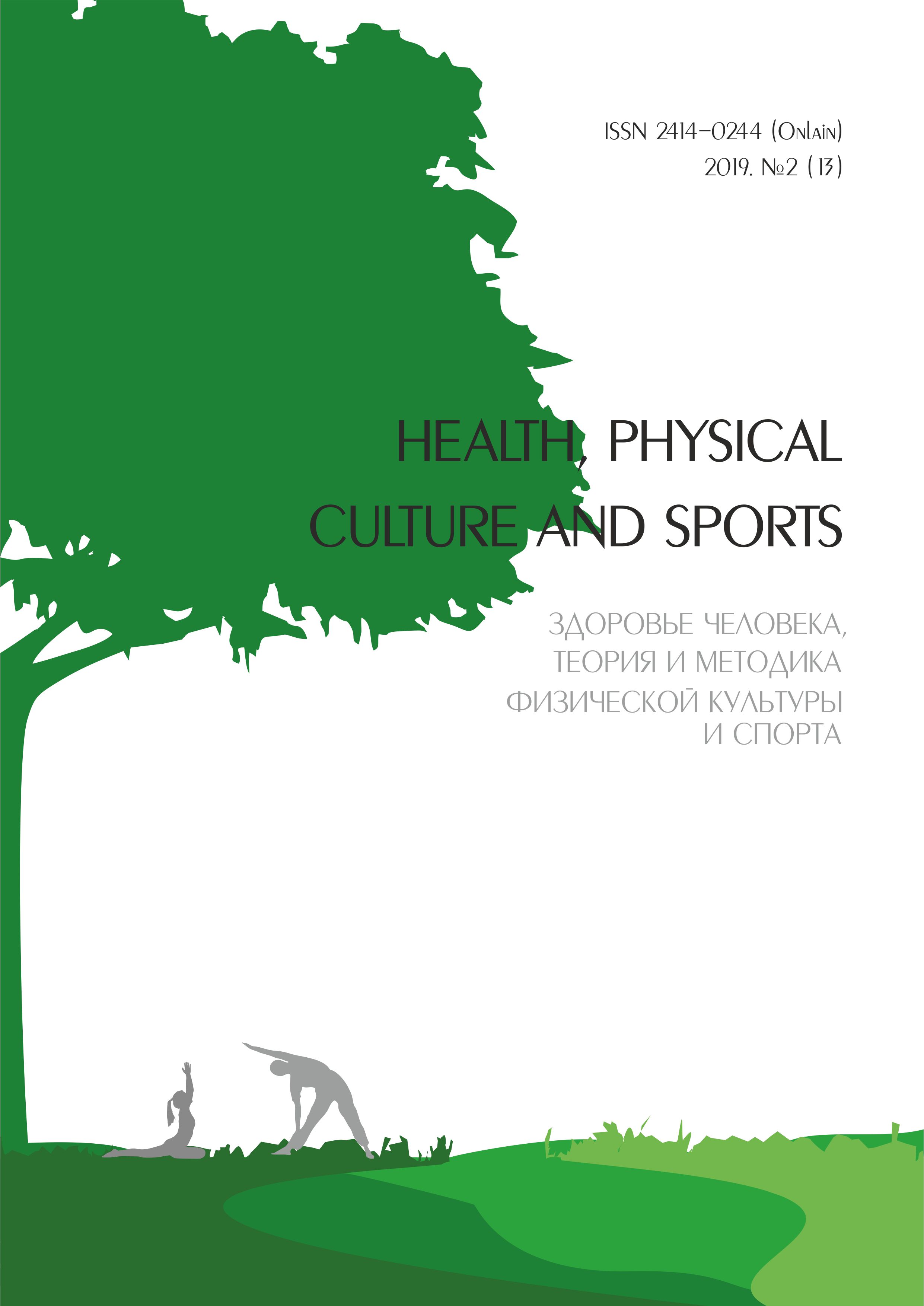Pedagogical aspects of formation of improving physical culture in the university
Abstract
Article Guryev S.V. "Pedagogical aspects of the formation of recreational physical culture in the university" contains theoretical and methodological and experimental material on the problem of determining pedagogical aspects as a factor in the development of physical culture of health-improving orientation with university students of 1-2 courses engaged in study time, according to the program of discipline in specially medical groups. This material examines the issues of motivation, interests and features of the organization of classes of recreational physical culture.
In strengthening the health and harmonious development of the personality, the importance of physical culture and sports increases every year, introducing them into everyday life. The achievements of science, which ensure its well-being and well-being, are undoubtedly placed at the service of man in our society. However, developing science, cognizing the laws of nature and using them to their advantage, man did not become a master of himself. The development, growth and changes of modern society, as well as the transition of higher education to student-centered pedagogy, every year make it necessary to shift the emphasis in the research activities of physical culture and sports. The level of health of modern students requires a serious approach to solving the problem of the formation of recreational physical culture in a university
Under the influence of physical exercises, an adaptation of the organism of any person to the manifestations of environmental factors occurs. The experimental data obtained will help to exert a stimulating effect of the organized physical activity of students of a special medical group on the level of physical fitness. It can be concluded that the motor function of the human body is essential for improving performance in any kind of activity, including mental activity, and it must be constantly improved.
The results of the experiment confirmed the effectiveness of the recommendations made by the author for physical culture classes in special medical groups and allow expanding the possibilities of the educational process for developing students' skills of a healthy lifestyle
Downloads
References
Ашмарин Б.А., Курамшин Ф. Педагогика физической культуры. СПб., 1999. 352 с.
Бала М.А. Высшее физкультурное образование: проблемы и решение. М., 2015. 186 с.
Борисова О.В., Кудинов А.А. Научно-методические основы определения уровня физической подготовленности студентов: учебно-методическое пособие. Волгоград, 2004. 49 с.
Булич Э.Г. Физическое воспитание в специальных медицинских группах. М., 2009. 358 с.
Вайнер Э.Н. Валеология : учебник для вузов. М., 2012. 86 с.
Виленский М.Я., Горшков А.Г. Физическая культура и здоровый образ жизни студента: учебное пособие. М., 2012. 158 с.
Лейфа A.B. Система физической активности и здоровьесберегающих средств как фактор достижения оптимального уровня профессиональной готовности студентов высших учебных заведений : автореф. дис. … канд. пед. наук. М., 2015. 48 с.
Мониторинг здоровья субъектов образовательного процесса в вузах. «Паспорт здоровья» : монография / под общ. ред. В.Ю. Лебединского. Иркутск, 2008. 268 с.
Семенов Л.А. Мониторинг кондиционной физической подготовленности в образовательных учреждениях: монография. М., 2016. 168 с.
Смурыгина Л.В., Разуваева И.Ю. Педагогические аспекты организации учебных и самостоятельных занятий в процессе физического воспитания студентов // Молодой ученый. 2015. №20. С. 188–190.
Чесебиева С.Т. Физическая культура как фактор утверждения здорового образа жизни студентов // Вестник Адыгейского государственного университета. 2011. №2. С. 8–12
References
Alkova S.Yu. The implementation of a differentiated approach in physical education based on the subjective experience of students // Theory and practice of physical culture. 2013. № 4. P. 10 (in Russian).
Ashmarin B.A., Kuramshin Yu.F. Pedagogy of physical culture. SPb., 1999. 352 p. (in Russian).
Bala M.A. Higher physical education education: problems and solutions. M., 2015. 186 p. (in Russian).
Borisova O.V., Kudinov A.A. Scientific and methodological basis for determining the level of physical fitness of students: a teaching aid. Volgograd, 2004. 49 p. (in Russian).
Bulich E.G. Physical education in special medical groups. M., 2009. 358 p. (in Russian).
Weiner E.N. Valeology: textbook for universities. M., 2012. 86 s. (in Russian).
Vilensky M.Ya., Pots A.G., Gorshkov A.G. Physical culture and healthy lifestyle of a student: study guide. M., 2012. 158 s. (in Russian).
Leif A.B. The system of physical activity and health-saving means as a factor in achieving the optimal level of professional readiness of students of higher educational institutions: Author. dis. Cand. ped. Sciences. M., 2015. 48 p. (in Russian).
Monitoring the health of subjects of the educational process in universities. Health Passport: monograph / ed. ed. Dr. med sciences, prof. V.Yu. Lebedinsky. Irkutsk, 2008. 268 p. (in Russian).
Semenov L.A. Monitoring of conditioned physical fitness in educational institutions: monograph. M., 2016. 168 p. (in Russian).
Smurygina L.V., Razuvaeva I.Yu. Pedagogical aspects of the organization of training and self-study in the process of physical education of students // Young scientist. 2015. №20. 188–190 p. (in Russian).
Chesebieva S.T. Physical culture as a factor in the approval of a healthy lifestyle of students. Bulletin of Adyghe State University. 2011. No.2. P. 8–12 (in Russian).
Copyright (c) 2019 Health, physical culture and sports

This work is licensed under a Creative Commons Attribution-NonCommercial 4.0 International License.
An author should not normally publish manuscripts describing essentially the same research in multiple journals or publication venues. Such redundant publication is generally considered to constitute unethical publishing behavior, and if discovered may result in a manuscript under consideration being rejected, or a published article being retracted.
Authors of manuscripts reporting on original research should present an accurate account of the work performed, accompanied by an objective discussion of its significance. Underlying data should be represented accurately in the manuscript. The manuscript should contain sufficient detail and references to permit others to replicate the work. The fabrication of results and the making of fraudulent or knowingly inaccurate statements constitute unethical behavior and may be cause for rejection or retraction of a manuscript or published article.





